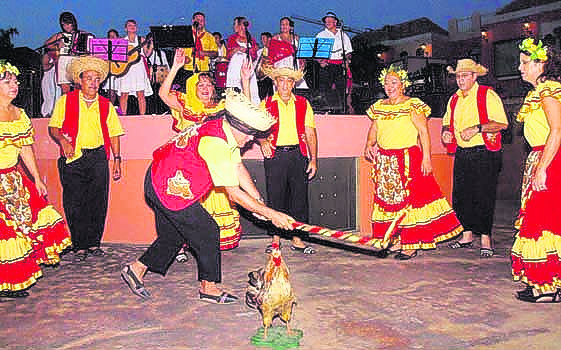(Oranjestad)—Vanessa de Kort, project leader at the Savaneta Neighborhood Center, has informed that on June 24th, they will be celebrating Dera Gay* at the neighborhood center to continue enriching the culture of Aruba.
The evening will begin at 6:00 PM and culminate at 10:00 PM with musical performances by Frank Croes and his Tipico Pega Saya, Masiduri dance group, Nos Cultura group, and as a special guest, Ivy and her group. Additionally, there will be Dera Gay competitions in the categories of children, youth, and adults.
At the same time, they will also have a competition for the best Dera Gay attire. The purpose of this evening is to enhance the culture of Aruba. De Kort expressed the intention of revitalizing the neighborhood center, which has seen a significant decrease in activities since the Covid-19 pandemic. She mentioned that they want to restore the neighborhood center’s function.
“We have already started with a few volleyball competitions. Savaneta is known for its volleyball and indoor soccer. The groups that were always there were Savaneta Six Stars, La Fama, Racket Club, and all those groups that had already established themselves. Now, we want to bring back the more recreational aspect that made Savaneta great in the 60s, 70s, and 80s.”
The intention is also to raise funds to renovate the neighborhood center. The stage, which is from the 1930s and has served as a theater, has lost its name and importance in recent years. De Kort mentioned that they want to bring it back and restore it not only for theater but also for dance, singing, and other activities.
De Kort emphasized that the costs for restoring the stage require a significant amount of money, and they have not yet made a budget for it. Nevertheless, they are aware that it is something that requires sufficient funding.
Furthermore, they are planning to organize more activities to restore the soccer and volleyball fields. The roof of the venue also needs attention, as there are many things that require repairs.
De Kort made a call to the residents, requesting active volunteers who are willing to participate and contribute to the work and effort needed for these activities.
Registration to participate in the Dera Gay event is free, as mentioned by De Kort. Those interested can contact her at (+297) 594 4570.
Dera Gay is a celebration with various origins and histories. The cultural festival of San Juan (St. John the Baptist), known locally as Dera Gay, dates back to 1862 and is celebrated every year on June 24th. The origin story of this religious and cultural festival has several versions.
The religious origin is associated with the birth date of St. John the Baptist, while the cultural origin is tied to the harvest festival. Although it has a religious aspect, Dera Gay is predominantly recognized as a cultural festival featuring music, dance, and singing. The dominant colors are red and yellow. Yellow symbolizes the flowering kibrahacha tree, while red represents the candle that is lit on the eve to announce the festival of the following day.
According to tradition, the festival begins on June 23rd when people light cornstalks as a symbolic cleansing to prepare for the new harvest season. On June 24th, after sunset, the celebration of San Juan starts in different districts with Dera Gay dance, candle dance, and flag dance. The candle dance is performed for protection against illness and bad luck. The most well-known dance is the Dera Gay, where a man, with his eyes covered and a stick in his hand, attempts to kill the “gay” (rooster). Previously, this dance took place in open fields with a live rooster.
Today, a dummy is used, and the dance takes place in clubs. Those who still perform the dance in the fields or on the ground use a calabash. There is also a flag dance, where small flags are placed on the ground, and a person with their eyes covered by a cloth searches for the flags. The ceremony is accompanied by folk music.
The prominent musical instruments are the fio, wiri, and tambu. The Dera Gay chant dates back to 1862. Of course, this celebration is not complete without traditional local food and drinks. The festival of San Juan and Dera Gay regained popularity in the 1970s among the local population, and schools also started paying attention to this popular festival. “San Juan is coming, San Juan is going.”
*Dera Gay: The word “gay” in Papiamento means “rooster”, and is pronounced like “guy”.

















